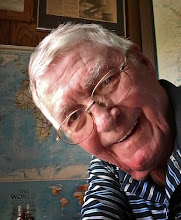A COMMEMORATIVE GATHERING--
to honor the Delaware Indian Village of Greentown
For the first time in 200 years the haunting sound of Indian drumbeats filled the natural amphitheater (above) which, two centuries ago, was adjacent to the site of a peaceful Indian village.
Today's Greentown Preservation Association, tells us, "Delaware Indians, along with a small group of Mingos, Mohawks and Mohegens, settled the present Greentown site as early as 1782."
The village included more than 150 dwellings by 1812, the year of our war of that same date, in which General William Hull surrendered to the British at Detroit in August.
Consequently the native American residents were removed from Greentown in September of that year--and their village was burned.
What we still remember with horror as the Copus Massacre happened in retaliation; peaceful victims of otherwise peaceful Indians who were watching their land and their culture being overrun by the white-man's expansion westward.
Delaware elder Michale Pace, whose Delaware name is Xingweleno, and his wife (above) drummed their ancestral music while dressed in authentic tribal regalia.
He shared a soothing message on the culture and history of his people, traditionally known as the Lenni Lenape.
Bobbi Harpster of Ashland, a descendant of the Copus family and shadowed behind the Paces (above), also told of her recollections of family reunions where, like their Indian counterparts, her family shuddered at the horrors of their history while sharing also her peaceful comfort at being able, that day, to jointly and joyfully celebrate the bicentennial of those events.
The day's celebration also involved demonstrations of weapons of the period and a large collection of archaeological relics, many from the actual site of Greentown.
The celebration also included an Indian version of the game we would recognize as football. It was called "Pahsaheman" in the Delaware language and involved the men against the women described in historical literature as a "very rough and tumble" event.
 In this day's version of the rules the men could not use their hands while the women were not thus encumbered. They played two halves with sometimes painful enthusiasm between goals marked by tree branches stuck in the ground.
In this day's version of the rules the men could not use their hands while the women were not thus encumbered. They played two halves with sometimes painful enthusiasm between goals marked by tree branches stuck in the ground.That's Mrs. Doc Shaffer of Bellville (above) tossing the ball in celebration of the women's lopsided victory.
 Other events during the day involved Indian reenactors, well versed in the history of their roles, sharing stories and answering questions from many of the several hundred folks in attendance.
Other events during the day involved Indian reenactors, well versed in the history of their roles, sharing stories and answering questions from many of the several hundred folks in attendance.He paused for a moment, looked me in the eye and said quietly, "Time Heals the Soul."
























